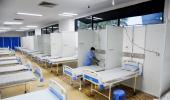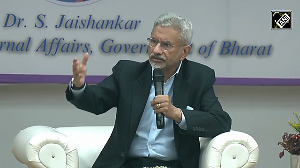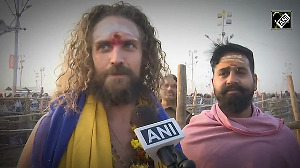With the Omicron variant of coronavirus slowly spreading its tentacles in the country, a number of states enhanced surveillance to trace, track and quarantine contacts of COVID-19 positive persons while Delhi began genome sequencing of samples of all infected people and has prohibited Christmas and New Year gatherings.

Haryana also imposed some curbs in public places from January 1.
India has so far recorded close to 250 cases of Omicron across 15 states and union territories even though at least 90 of the infected people have either recovered or migrated.
Amid fresh concerns caused by the Omicron variant, Prime Minister Narendra Modi will hold a meeting on the COVID-19 situation in the country on Thursday.
Official sources said Modi will take stock of the pandemic situation across the country.
With the national capital recording over 50 cases of Omicron, Delhi Chief Minister Arvind Kejriwal will also hold a review meeting on Thursday to assess the preparedness and management of the new variant of the virus.
During the day, nine cases were recorded in Kerala, four in Rajasthan, two in Andhra Pradesh and one in Haryana among others.
The Delhi Disaster Management Authority (DDMA), on the other hand, directed district magistrates to ensure no Christmas and New Year gathering takes place in the national capital.
However, restaurants and bars will continue to operate with up to 50 per cent of the seating capacity. Marriage-related gatherings are permitted with a maximum of 200 people in attendance.
'All social/political/cultural/religious/festival related gatherings are prohibited throughout NCT of Delhi... All district magistrates and DCPs shall ensure that no cultural event/gatherings/congregation takes place for celebrating Christmas or New Year in the NCT of Delhi,' the DDMA order stated.
The national capital logged 125 cases on Wednesday, the highest since June 22, when it had reported 134 cases of the infection.
In the wake of 19 Omicron cases being detected in the state, the Karnataka government has directed district authorities and health officials to enhance surveillance and designate contact tracers and quarantine observers to curb the spread.
In a circular principal secretary, health and family welfare, T K Anil Kumar said primary and secondary contacts should be identified within 24 hours of reporting of COVID positive case.
The primary contacts should be tested on the first day and again on the eight day and home quarantined for seven days from the date of COVID positive reporting.
Similarly the international travellers from high risk countries need to be quarantined for seven days from the date of their arrival, until the follow-up and repeat RT-PCR test on the eighth day, according to the circular.
Regarding surveillance, he said healthcare personnel such as public health inspecting officers, community health officers and ASHA workers or such other persons who are doing these activities of contact tracing, quarantine and home isolation watch should continue to do them.
Delhi Health Minister Satyendar Jain said genome sequencing of samples of all Covid-infected people in Delhi has begun to ascertain if Omicron variant has spread in the community.
"The Delhi government-run labs at the Lok Nayak Hospital and the Institute of Liver and Biliary Sciences can sequence 100 samples each day. Two Centre-run labs in Delhi can sequence 200-300 samples a day. So, 400-500 samples can be analysed in a day," Jain said.
A day after Odisha reported its first Omicron case, Chief Minister Naveen Patnaik appealed to people to strictly follow the COVID-19 appropriate behaviour to defeat the new variant of coronavirus.
The state government convened a meeting of senior officials to discuss additional measures to be taken in view of the Omicron variant.
The meeting resolved to increase surveillance and vaccination activities and also expand genome sequencing tests.
Eligible people who are not fully vaccinated will not be permitted inside crowded places like malls, cinema halls, restaurants and grain markets in Haryana from January 1, state Health Minister Anil Vij announced.
According to an official order, no individual, including government servants, is allowed to visit government offices without being fully vaccinated.
Vij said the decision has been taken because the vaccine is the biggest protection from Covid, including its various variants, and a large number of eligible beneficiaries in Haryana were overdue for a second vaccination dose.
A woman who travelled from Canada to Faridabad in Haryana tested positive for Omicron variant, Vij said.
Her two primary contacts, mother and aunt, have also tested positive for COVID and their samples have been sent for genome sequencing.
All three have been quarantined at a private health facility in Faridabad, Vij said.
Three other travellers, with a travel history abroad who were headed to Haryana to either meet relatives or friends, have also tested positive for Omicron, but they did not enter Haryana and have been quarantined in Delhi after testing Covid positive and later positive for the new variant, said Vij.
A foreigner was among four people found infected with the Omicron variant in Jaipur. With the latest cases, a total of 22 people have so far been infected by the Omicron variant across the state.
Jaipur Chief Medical Health Officer Dr Narottam Sharma said contact tracing of those who have been infected with the new variant is going on.
In Kerala, nine more cases of the Omicron variant were detected, taking the tally to 24, state Health Minister Veena George said.
Six people who reached Ernakulam and three who reached Thiruvananthapuram have been detected with the virus.
Two persons from the UK, aged 18 and 47 years, a 43-year-old woman and a 11-year-old from Tanzania, a woman aged 44 from Ghana and a 26-year-old woman from Ireland are those found infected in Ernakulam.
A couple aged 54 and 52 from Nigeria and a woman aged 51 from the UK were confirmed with the infection in Thiruvananthapuram.
Andhra Pradesh reported its second positive case of Omicron after the samples of a 39-year-old woman who recently arrived from Kenya was detected to have carried it.
Jammu and Kashmir Chief Secretary Arun Kumar Mehta chaired a meeting to review the public health system's preparedness for the new variant.
Three cases of Omicron variant were reported in Jammu on Tuesday, all of whom are without any travel history and are now being monitored.
Mehta directed the district administration to enhance testing and contact tracing for positive patients and closely trace the infection trajectory to establish micro-containment zones at an early stage.
All deputy commissioners were also directed to ensure strict enforcement of COVID-appropriate behaviour, COVID-19 SOPs and protocols, and micro-containment zones, besides regulating large gatherings.
Meanwhile, All India Institute of Medical Sciences Director Dr Randeep Guleria has stressed on adhering to Covid-appropriate behaviour, observing that people have become lax in following these norms.
He also underlined that people should get vaccinated and those who have taken the first shot should not miss out on the second dose.
"Omicron is highly transmissible which means this variant spreads rapidly and therefore adhering to Covid norms is very important. People should regularly wear masks, maintain physical distance and avoid gatherings which can become super spreading events," Guleria told PTI.
Stating that the Omicron variant is at least three times more transmissible than the Delta variant, the Centre on Tuesday asked states and union territories to activate 'war rooms' and keep analysing all trends and surges, ensure proper data analysis, and take strict and prompt containment action at the local and district level.
In a letter to states and union territories, Union Health Secretary Rajesh Bhushan advised implementing strategic interventions for containment like imposition of night curfew, strict regulation of large gatherings, curtailing numbers in marriages and funerals besides increasing testing and surveillance.











 © 2025
© 2025